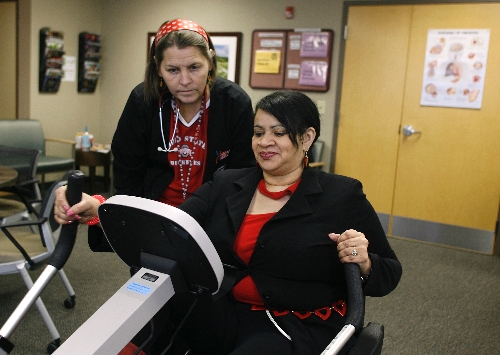Doctors’ group says it’s OK to have sex a week after cardiac arrest if you can climb stairs

CHICAGO — Good news: Sex is safe for most heart patients. If you’re healthy enough to walk up two flights of stairs without chest pain or gasping for breath, you can have a love life.
That advice from a leading doctors’ group on Thursday addresses one of the most pressing, least discussed issues facing survivors of heart attacks and other heart patients.
In its first science-based recommendations on the subject, the American Heart Association says having sex only slightly raises the chance for a heart attack. And that’s true for people with and without heart disease.
Despite the higher risk for a heart patient to have a second attack, there’s no evidence that they have more sex-related heart attacks than people without cardiac disease.
Many heart patients don’t think twice about climbing stairs, yet many worry that sexual activity will cause another heart attack, or even sudden death, said Dr. Glenn Levine, lead author of a report detailing the recommendations and a professor of medicine at Baylor College of Medicine in Houston.
The report says sex is something doctors should bring up with all heart patients. Yet few do because they’re uncomfortable talking about it or they lack information, Levine said. The new guidance is designed to fill that gap.
Heart patients should get a doctor’s OK before engaging in sexual activity. Many may be advised first to do cardiac rehab — exercise while being monitored for heart symptoms, to improve heart strength and increase physical fitness. But the heart association says most eventually will be cleared to resume sexual activity.
The doctors’ group offers advice for heart patients based on scientific research involving sometimes provocative sex-related topics:
■ Who’s most at risk for sudden death related to sex? Married men having affairs, often with younger women in unfamiliar settings. Those circumstances can add to stress that may increase the risks, evidence from a handful of studies suggests.
■ Sex may be OK as soon as one week after a relatively mild heart attack, if patients can walk up a few flights of stairs without discomfort.
■ Viagra and other drugs for erectile dysfunction are generally safe for men with stable heart disease.
"The risk of having a heart attack during sexual activity is two to three times higher than when not having sexual activity. However, this increased risk of heart attack during sexual activity represents only a very small part of a person’s overall risk of having a heart attack, and sexual activity is the cause of less than 1 percent of all heart attacks," Levine said.
Among heart attack survivors, average risks for another heart attack or sudden death are about 10 in 1 million per hour; having sex increases that to about 20 to 30 in 1 million per hour of sexual activity, the new report says. People without heart disease face lower overall risks for a heart attack, but similar risks for a sex-related attack.
The updated advice was released online Thursday in the heart association journal, Circulation.
Dr. Keith Churchwell, chief medical officer of Vanderbilt University’s Heart and Vascular Institute, said the guidance is important for patients, and that questions about sex are the most common ones he hears from heart patients.
Ohio State University heart specialist Martha Gulati praised the recommendations for emphasizing that sexual counseling is important not just for patients but also their partners, who she says are often just as nervous about resuming sexual activity.
Day-care operator Tammy Collins of Reynoldsburg, Ohio, one of Gulati’s patients, says the advice is reassuring.
She had a heart attack last year on Sept. 11, during a trip to Cincinnati to celebrate her wedding anniversary.
Collins’ mother died of a heart attack at the same age, on her 51st birthday. With high blood pressure and high cholesterol, Collins knew she was at risk. She developed symptoms a few hours after having sex. She dismissed it at first, until she felt a sharp pain in her upper back and had trouble breathing. She was rushed to the hospital and doctors used stents to open blocked arteries.
Collins said she wasn’t embarrassed to ask Gulati about sex, who told her it was unlikely that her night of romance had caused the heart attack. After several weeks of cardiac rehab, she was cleared to resume sexual activity — advice that surprised her friends. But Collins said the exercise sessions have made her feel fitter than ever.
"A heart attack does not have to be the end of living," Collins said.
Chicago cardiologist Dan Fintel, a professor of medicine at Northwestern University, said he routinely gives heart patients a sex talk on their last day in the hospital, knowing that it’s likely on their minds.
"Resuming sexual activity is safe and emotionally part of the healing process, with a few caveats," he tells patients.
Those caveats elicit nervous chuckles when he explains that includes no philandering, given evidence about that causing extra stress.
ON THE WEBCirculation
u25B6 bit.ly/1mt2UY












